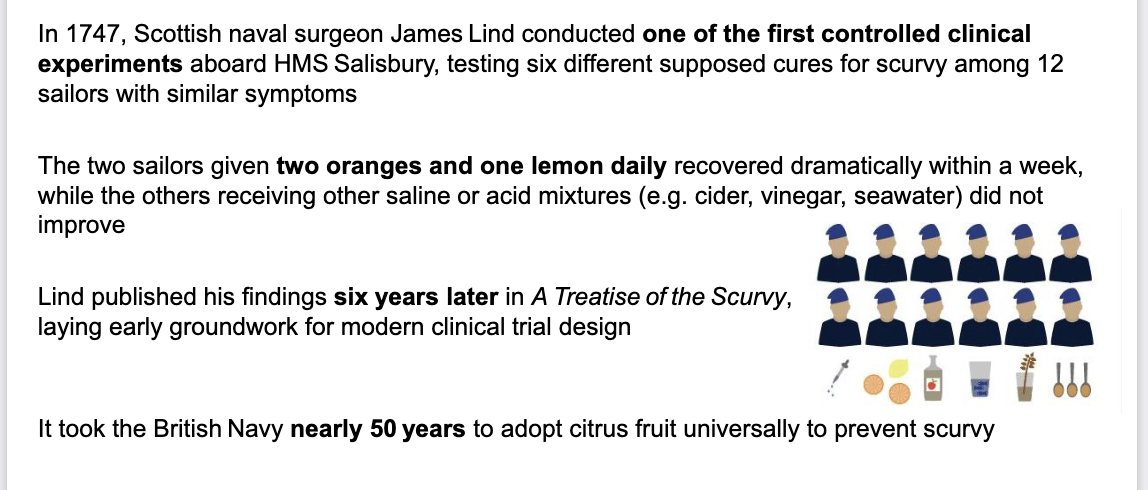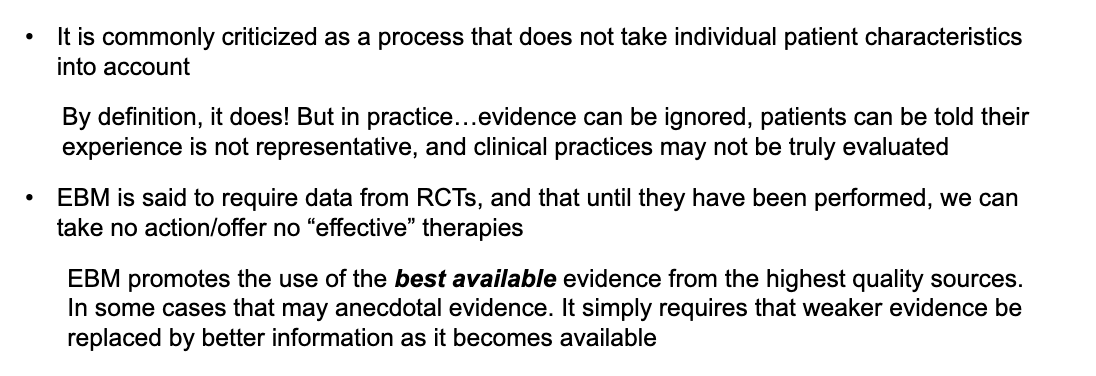Evidence Based Medicine
1/25
There's no tags or description
Looks like no tags are added yet.
Name | Mastery | Learn | Test | Matching | Spaced |
|---|
No study sessions yet.
26 Terms
How can medicine move away from subjective habits and opinions?
By shifting toward objective, testable knowledge grounded in evidence.
What does it mean for scientists and clinical professors to be conscientious?
To act intentionally and thoughtfully, performing duties thoroughly and with professional integrity.
What should patients be protected from when receiving care?
Ineffective or harmful interventions.
What role should patients have in decision-making?
They should have a say in which outcomes matter most to them (e.g., pain relief, palliative care, safe discharge).
What are the three core components of evidence-based medicine (EBM)?
Best research evidence
clinical expertise,
patient values/preferences.

What is the definition of EBM according to the Centre for Evidence-Based Medicine (Toronto)?
The integration of best research evidence with clinical expertise and patient values to achieve the best outcomes.
Why can’t evidence alone guide EBM?
Because clinical decisions must also consider clinician judgment and what matters to the patient.
What does EBM help identify?
What treatments work for everyone, what doesn’t work, and where evidence is missing.
Best Research Evidence
High-quality clinical research that evaluates how accurate tests are, how strong prognostic markers are, and how effective and safe treatments are.
Clinical Expertise
The clinician’s skill in identifying each patient’s diagnosis, weighing intervention risks and benefits, and understanding patient expectations.
Patient Values
The unique preferences and priorities that guide patient-centered decision-making.
Is evidence based medicine a new concept
no trishs greenhalgh made a book about it in 2014
History of observations and data in medical care

Core principles of evidence based medicine (EBM)?

important
EBM avoids basing medical descions on

important
What is the true issue behind most criticisms of Evidence-Based Medicine (EBM)?
The issue is how it is implemented, not the principles of EBM itself.
Unfair critismsm of EBM

legitimate criticisms of EBM
Many clinicians lack training to critique statistical methods
EBM guidelines often don’t fit complex, multi-morbid patients
Limited evidence exists for rare or emerging conditions
Every level of EBM is affected by biases
What is one major criticism of EBM regarding its definition of evidence?
Critics argue that EBM offers too narrow a definition of what counts as evidence.
Why are randomized controlled trials (RCTs) not the only valuable form of knowledge?
Because other forms of knowledge and reasoning can also be valuable, especially in contexts where RCTs are not practical or relevant.
What is a major shortcoming of EBM when applied to diverse groups?
There are massive gaps in clinical evidence and applicability for marginalized or underrepresented populations.
usually it relies on studies conducted in urban americans and europenas
What are traditional medicine systems rooted in?
Cultural beliefs and centuries-old observations, often different from Western biomedical approaches.
What do integrative health models propose?
That multiple scientific, experiential, cultural, and ethical viewpoints (epistemologies) can improve communication and collaborative care.
Epistemologies
refers to different theories or approaches to understanding how knowledge is acquired, validated and used
What is the goal of integrative medicine?
To bridge evidence-based medicine with factors not captured by RCT-based evidence, such as cultural differences and community values.
Does integrative medicine reject scientific rigor?
